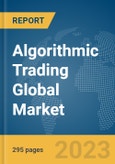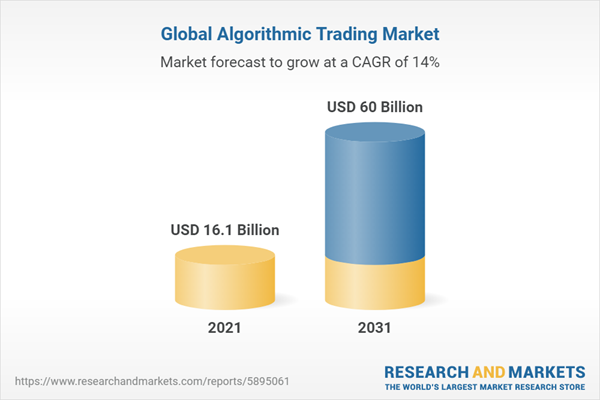The global algorithmic trading market reached a value of nearly $16,121.1 million in 2022, having grown at a compound annual growth rate (CAGR) of 13.8% since 2017. The market is expected to grow from $16,121.1 million in 2022 to $28,908.9 million in 2027 at a rate of 12.4%. The market is then expected to grow at a CAGR of 15.7% from 2027 and reach $60,027.1 million in 2032.
Growth in the historic period resulted from the strong emerging markets growth, the rising demand for fast, reliable and effective order execution, the increasing government regulations, the growth in digitalization and increased demand for computing devices such as PCs and laptops. Factors that negatively affected growth in the historic period were security concerns associated with online trading and the lack of consistency in algorithmic trading.
Going forward, government support, the global population growth and urbanization, the increasing internet penetration and the increasing adoption of algorithmic trading in financial institutions will drive the growth. Factors that could hinder the growth of the algorithmic trading market in the future include stringent government regulations and the insufficient risk valuation capabilities in algorithmic trading systems.
The algorithmic trading market is segmented by type into foreign exchange (FOREX), stock markets, exchange-traded fund (ETF), bonds and other types. The stock markets market was the largest segment of the algorithmic trading market segmented by type, accounting for 37.2% of the total in 2022. Going forward, the stock markets segment is expected to be the fastest growing segment in the algorithmic trading market segmented by type, at a CAGR of 12.0% during 2022-2027.
The algorithmic trading market is segmented by component into solution and services. The solution market was the largest segment of the algorithmic trading market segmented by component, accounting for 68.5% of the total in 2022. Going forward, the solution segment is expected to be the fastest growing segment in the algorithmic trading market segmented by component, at a CAGR of 12.6% during 2022-2027.
The algorithmic trading market is segmented by function into programming, debugging, data extraction, back-testing and optimization and risk management. The programming market was the largest segment of the algorithmic trading market segmented by function, accounting for 38.0% of the total in 2022. Going forward, the programming segment is expected to be the fastest growing segment in the algorithmic trading market segmented by function, at a CAGR of 12.9% during 2022-2027.
The algorithmic trading market is segmented by type of traders into institutional investors, retail investor, long-term trading and short-term traders. The institutional investors market was the largest segment of the algorithmic trading market segmented by type of traders, accounting for 46.9% of the total in 2022. Going forward, the retail investors segment is expected to be the fastest growing segment in the algorithmic trading market segmented by type of traders, at a CAGR of 13.4% during 2022-2027.
North America was the largest region in the algorithmic trading market, accounting for 40.9% of the total in 2022. It was followed by Asia-Pacific, Western Europe and then the other regions. Going forward, the fastest-growing regions in the algorithmic trading market will be Asia-Pacific and South America where growth will be at CAGRs of 15.3% and 12.5% respectively. These will be followed by North America and Western Europe where the markets are expected to grow at CAGRs of 11.6% and 10.6% respectively.
The global algorithmic trading market is highly fragmented, with a large number of small players operating in the market. The top ten competitors in the market made up to 3.57% of the total market in 2021. The companies in the market are consistently adopting expansion strategies and undertook collaborations, partnerships and mergers and acquisitions, to gain traction in this high growth market across different regions. Virtu Financial Inc was the largest competitor with 1.70% of the market, followed by IG Group Holdings Plc with 0.73%, FXCM Group with 0.50%, London Stock Exchange Group Plc with 0.42%, TradeStation with 0.09%, Software AG with 0.07%, Wyden (Algo Trader AG) with 0.04%, Symphony Fintech Solutions Pvt Ltd with 0.01%, MetaQuotes Software Corp with 0.01% and 63 Moons Technologies Limited with 0.01%.
The top opportunities in the algorithmic trading market segmented by type will arise in the stock markets segment, which will gain $4,567.1 million of global annual sales by 2027. The top opportunities in the algorithmic trading market segmented by component will arise in the solution segment, which will gain $8,941.7 million of global annual sales by 2027. The top opportunities in the algorithmic trading market segmented by function will arise in the programming segment, which will gain $5,109.1 million of global annual sales by 2027. The top opportunities in the algorithmic trading market segmented by type of traders will arise in the institutional investors segment, which will gain $6,172.3 million of global annual sales by 2027. The algorithmic trading market size will gain the most in the USA at $4,325.9 million.
Market-trend-based strategies for the algorithmic trading market include focus on use of artificial intelligence (AI) to capitalize on the data from digitally driven channels, focus on collaborations and acquisitions to improve their financial strength, product portfolio and geographical presence, focus on new technologies and developing technologically-advanced solutions to strengthen their position in the market, focus on product innovations and developing new product solutions to grow in the market and focus on cloud-based algorithmic trading to increase their productivity and efficiency.
Player-adopted strategies in the algorithmic trading market include focus on providing world-class execution solutions through strategic collaborations and partnerships and enhancing operational capabilities through strategic acquisitions.
To take advantage of the opportunities, the analyst recommends the algorithmic trading companies to focus on cloud-based algorithmic trading, focus on technological advancements, focus on product innovations, expand in emerging markets, continue to focus on developed markets, focus on partnerships and collaborations, provide competitively priced offerings, continue to use B2B promotions, and continue to focus on fast-growing types of traders.
Table of Contents
Executive Summary
Algorithmic Trading Global Market Opportunities And Strategies To 2032 provides the strategists; marketers and senior management with the critical information they need to assess the global algorithmic trading market as it emerges from the COVID-19 shut down.Reasons to Purchase
- Gain a truly global perspective with the most comprehensive report available on this market covering 12 geographies.
- Understand how the market is being affected by the coronavirus and how it is likely to emerge and grow as the impact of the virus abates.
- Create regional and country strategies on the basis of local data and analysis.
- Identify growth segments for investment.
- Outperform competitors using forecast data and the drivers and trends shaping the market.
- Understand customers based on the latest market research findings.
- Benchmark performance against key competitors.
- Utilize the relationships between key data sets for superior strategizing.
- Suitable for supporting your internal and external presentations with reliable high-quality data and analysis
Description:
Where is the largest and fastest growing market for algorithmic trading? How does the market relate to the overall economy; demography and other similar markets? What forces will shape the market going forward? The algorithmic trading market global report answers all these questions and many more.The report covers market characteristics; size and growth; segmentation; regional and country breakdowns; competitive landscape; market shares; trends and strategies for this market. It traces the market’s historic and forecast market growth by geography. It places the market within the context of the wider algorithmic trading market; and compares it with other markets.
The report covers the following chapters:
- Introduction and Market Characteristics - Brief introduction to the segmentations covered in the market, definitions and explanations about the algorithmic trading market.
- Key Trends - Highlights the major trends shaping the global algorithmic trading market. This section also highlights likely future developments in the market.
- Global Market Size and Growth - Global historic (2017-2022) and forecast (2022-2027, 2032F) market values, and drivers and restraints that support and control the growth of the market in the historic and forecast periods.
- Regional Analysis - Historic (2017-2022) and forecast (2022-2027, 2032F) market values and growth and market share comparison by region.
- Market Segmentation - Contains the market values (2017-2022) (2022-2027, 2032F) and analysis for each segment by type, by component, by function and by type of traders in the market.
- Regional Market Size and Growth - Regional market size (2022), historic (2017-2022) and forecast (2022-2027, 2032F) market values, and growth and market share comparison of countries within the region. This report includes information on all the regions Asia-Pacific, Western Europe, Eastern Europe, North America, South America, Middle East and Africa and major countries within each region.
- Competitive Landscape - Details on the competitive landscape of the market, estimated market shares and company profiles of the leading players.
- Key Mergers and Acquisitions - Information on recent mergers and acquisitions in the market covered in the report. This section gives key financial details of mergers and acquisitions, which have shaped the market in recent years.
- Market Opportunities And Strategies - Describes market opportunities and strategies based on findings of the research, with information on growth opportunities across countries, segments and strategies to be followed in those markets.
- Conclusions And Recommendations - This section includes recommendations for algorithmic trading providers in terms of product/service offerings geographic expansion, marketing strategies and target groups.
- Appendix - This section includes details on the NAICS codes covered, abbreviations and currencies codes used in this report.
Scope:
Markets Covered:
1) By Type: Foreign Exchange (FOREX); Stock Markets; Exchange-Traded Fund (ETF); Bonds; Other Types2) By Component: Solution; Services
3) By Function: Programming; Debugging; Data Extraction; Back-Testing And Optimization; Risk Management
4) By Type Of Traders: Institutional Investors; Retail Investor; Long-Term Trading; Short-Term Traders
Companies Mentioned: Virtu Financial Inc; IG Group Holdings Plc; FXCM Group; London Stock Exchange Group Plc; Trade Station
Countries: China; Australia; India; Indonesia; Japan; South Korea; USA; Brazil; France; Germany; UK; Russia
Regions: Asia-Pacific; Western Europe; Eastern Europe; North America; South America; Middle East; Africa
Time series: Five years historic and ten years forecast.
Data: Ratios of market size and growth to related markets; GDP proportions; expenditure per capita; algorithmic trading indicators comparison.
Data segmentations: country and regional historic and forecast data; market share of competitors; market segments.
Sourcing and Referencing: Data and analysis throughout the report is sourced using end notes.
Companies Mentioned
- Virtu Financial Inc
- IG Group Holdings Plc
- FXCM Group
- London Stock Exchange Group Plc
- Trade Station
- Software AG
- Wyden (Algo Trader AG)
- Symphony Fintech Solutions Pvt Ltd
- MetaQuotes Software Corp
- 63 Moons Technologies Limited
- iRage Capital
- AlphaGrep
- Kivi Capital
- Mansukh Securities
- Algoji
- Tickeron, Inc
- 1000pip Climber Robot
- Build Alpha
- Coinrule
- Trality
- IntoDarkness
- MetaTrader4
- Hugh
- Curate
- Avaloq Blockchain
- Glencore (GLEN)
- Barclays
- Prudential
- Lloyds Banking Group
- DTI Algorithmic
- BitOasis
- Gath3r
- MidChains
- HAYVN
- XTX Markets
- ActiveViam
- Redline Trading Solutions, Inc
- J.P. Morgan
- Capital Group
- Goldman Sachs
- Zen Trading Strategies
- SmarttBot
- ATOM S/A
- Ultrapar Participacoes
- Banco Bradesco S.A
- Itau Unibanco
- Interactive Brokers
- IG Trading
- AVAtrade
- eTORO
- Arabeya Online
- CalBank PLC
- Plus500
- XTB
- Saxo Bank
- City Index
Table Information
| Report Attribute | Details |
|---|---|
| No. of Pages | 295 |
| Published | October 2023 |
| Forecast Period | 2021 - 2031 |
| Estimated Market Value ( USD | $ 16.1 Billion |
| Forecasted Market Value ( USD | $ 60 Billion |
| Compound Annual Growth Rate | 14.0% |
| Regions Covered | Global |
| No. of Companies Mentioned | 56 |









